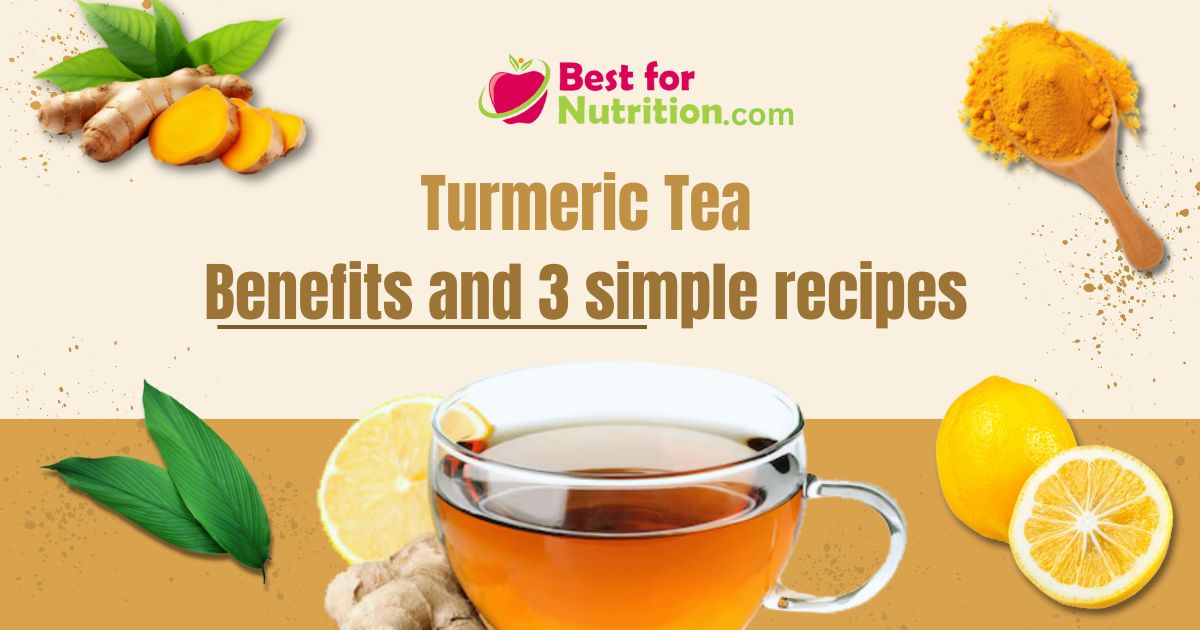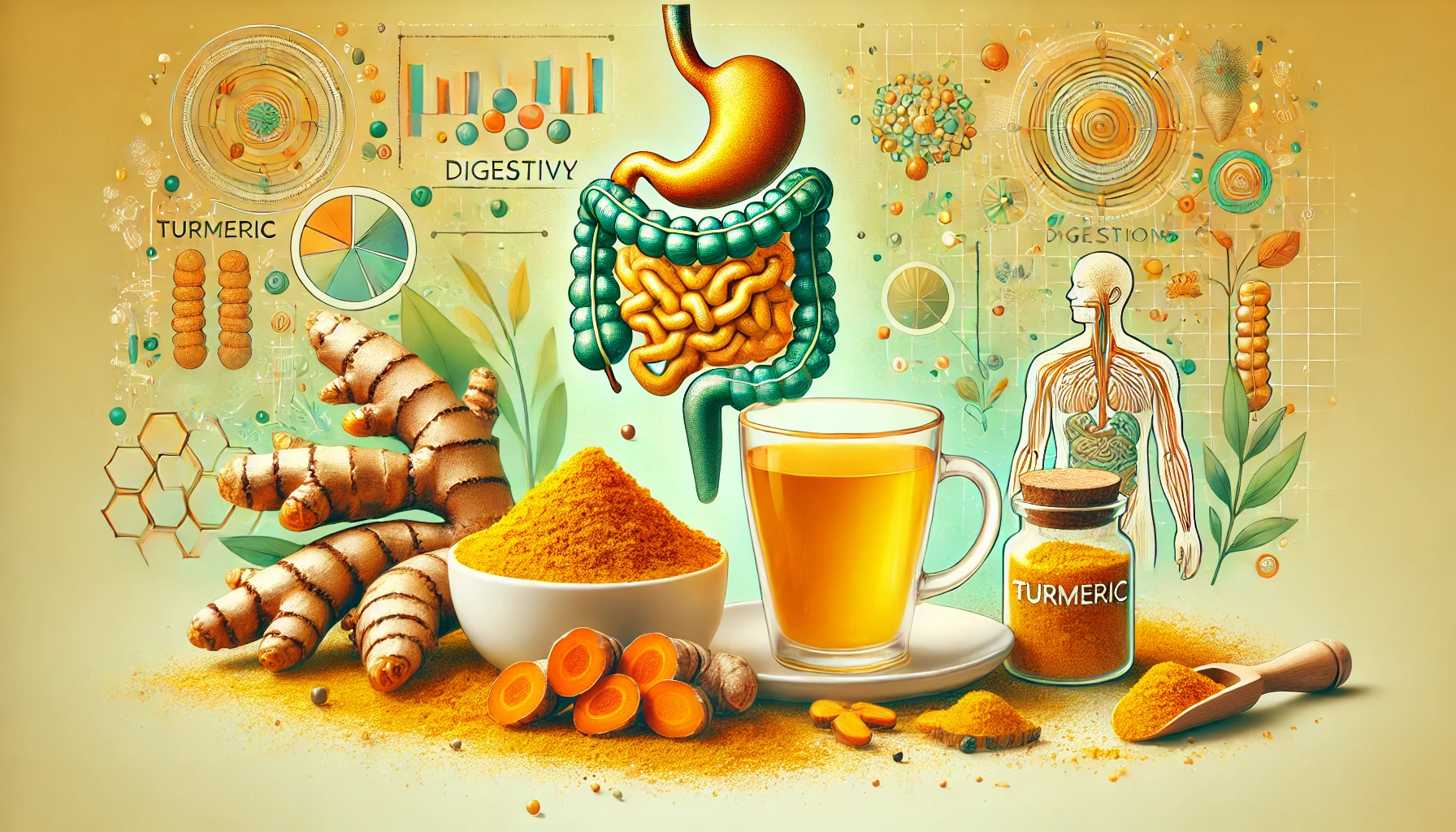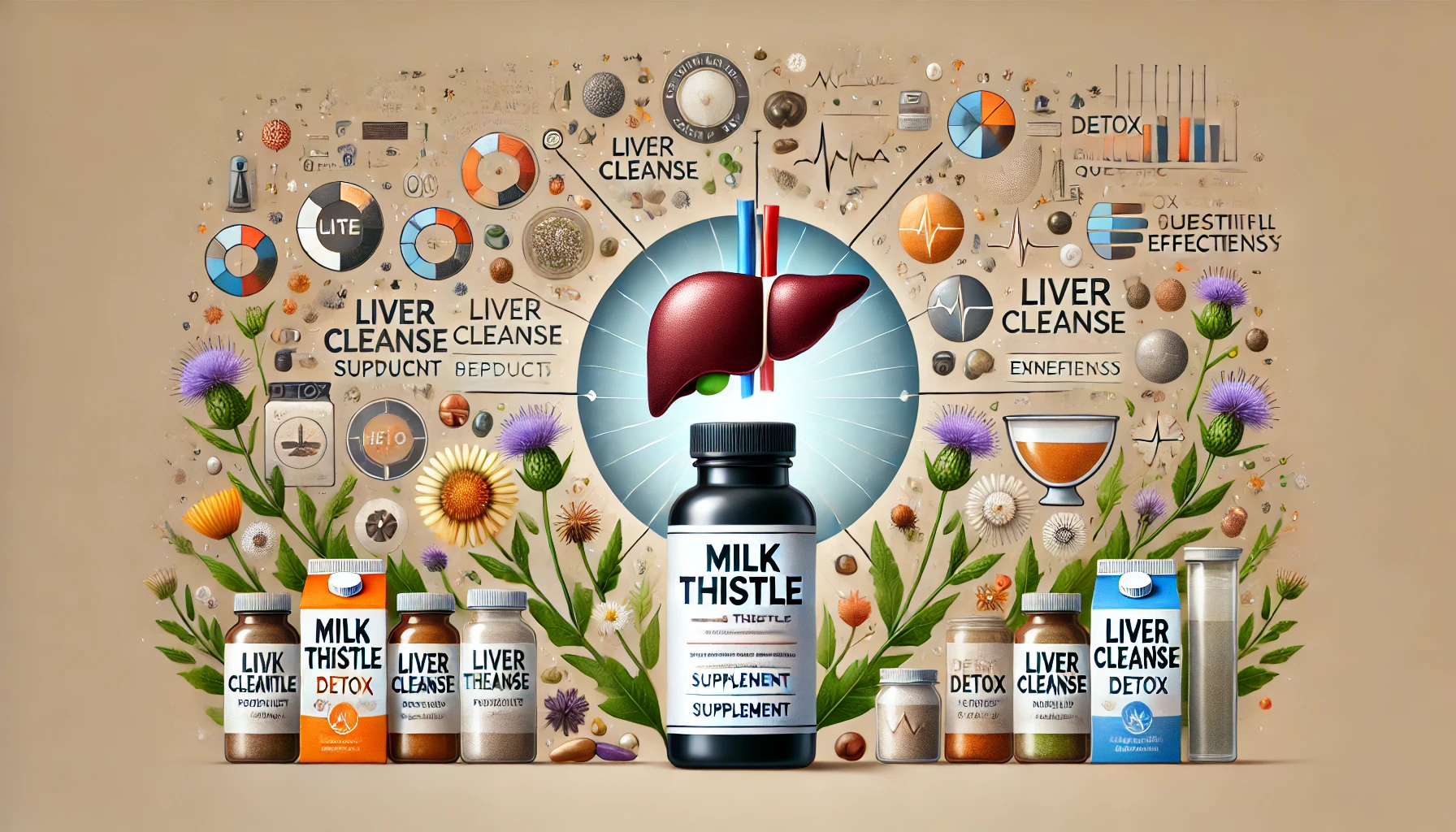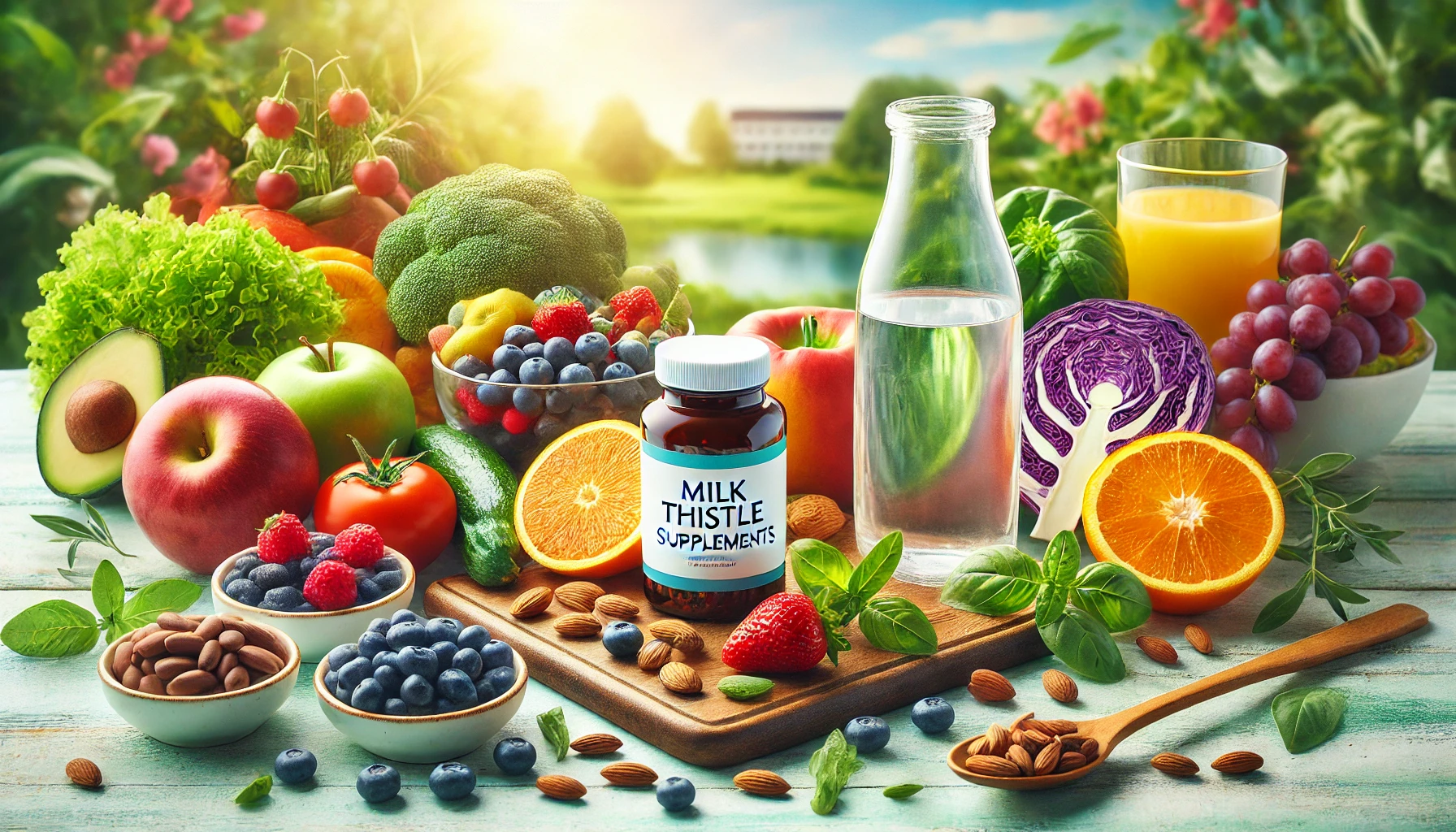Milk thistle and turmeric are two potent herbs that have been used for centuries in traditional medicine. While they each offer unique health benefits, combining them may provide a synergistic effect, enhancing their overall impact on health and wellness. In this article, we’ll explore the benefits, potential side effects, and ways to incorporate milk thistle and turmeric into your daily routine.
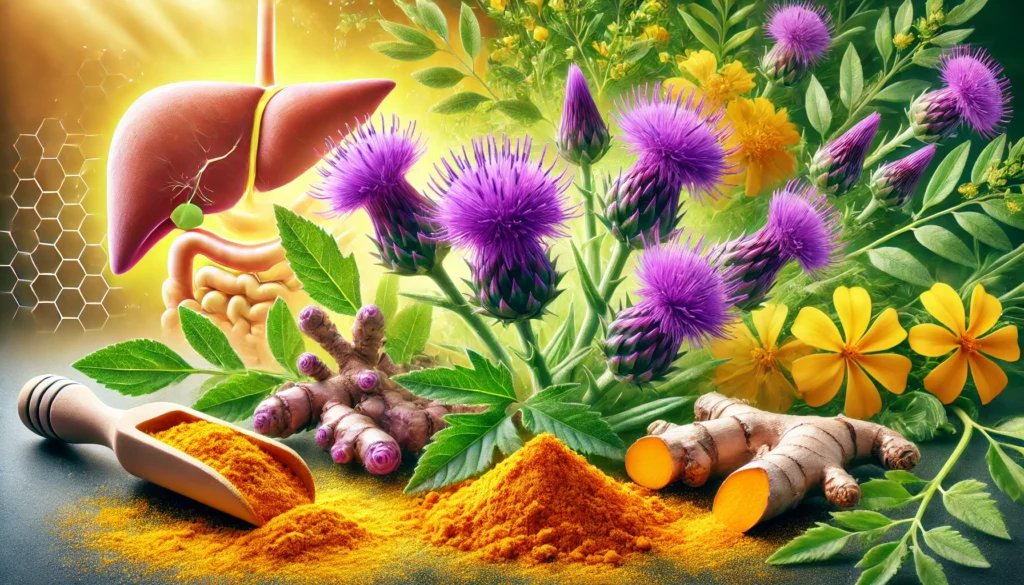
Benefits of Milk Thistle
Milk thistle (Silybum marianum) is a flowering herb known for its liver-protective properties. The active compound, silymarin, has antioxidant, antiviral, and anti-inflammatory properties, making milk thistle a popular choice for liver health and detoxification (1).
- Liver Health: Milk thistle is best known for its ability to support liver health. Studies suggest that silymarin can help protect the liver from toxins and promote the regeneration of liver cells, making it beneficial for individuals with liver conditions such as hepatitis or fatty liver disease.
- Antioxidant Properties: As a powerful antioxidant, silymarin helps combat oxidative stress and reduces inflammation in the body. This can aid in protecting the liver and other organs from damage caused by free radicals.
- Support for Skin Health: Milk thistle’s anti-inflammatory properties may also benefit the skin by reducing redness, swelling, and irritation associated with certain skin conditions like acne or eczema.
Summary:
“Milk thistle is primarily known for its liver-protective properties, antioxidant effects, and potential benefits for skin health.”
Benefits of Turmeric
Turmeric (Curcuma longa) is a vibrant yellow spice commonly used in Indian cuisine. It contains an active compound called curcumin, which is renowned for its anti-inflammatory and antioxidant properties (2).
- Anti-Inflammatory Effects: Curcumin is widely recognized for its ability to reduce inflammation, which can help manage chronic inflammatory conditions such as arthritis, inflammatory bowel disease, and cardiovascular diseases.
- Antioxidant Benefits: Turmeric’s antioxidant properties can neutralize free radicals in the body, potentially reducing the risk of chronic diseases, including cancer and neurodegenerative conditions like Alzheimer’s.
- Digestive Health: Turmeric has been shown to improve digestive health by stimulating bile production, which aids in the digestion of fats. It may also help relieve symptoms of bloating and gas.
Summary:
“Turmeric offers potent anti-inflammatory and antioxidant benefits and supports digestive health by stimulating bile production.”
The Synergistic Benefits of Milk Thistle and Turmeric
Combining milk thistle and turmeric can amplify their individual health benefits. Both herbs have strong anti-inflammatory and antioxidant properties that can work together to provide comprehensive support for various bodily functions (3).
- Enhanced Liver Support: The combination of silymarin and curcumin may provide enhanced liver protection by improving detoxification and reducing liver inflammation.
- Improved Digestion: Together, milk thistle and turmeric can promote digestive health by aiding in the breakdown of fats and reducing inflammation in the gastrointestinal tract.
- Joint and Muscle Health: The anti-inflammatory properties of both herbs can help alleviate pain and inflammation associated with joint conditions, such as arthritis, and muscle soreness.
Summary:
“Milk thistle and turmeric together may enhance liver protection, improve digestion, and support joint and muscle health due to their combined anti-inflammatory and antioxidant effects.”
Potential Side Effects and Precautions
While milk thistle and turmeric are generally considered safe, they may cause side effects in some individuals, especially when taken in large quantities or combined with certain medications.
- Possible Side Effects: Common side effects may include mild digestive issues such as bloating, gas, or diarrhea. In rare cases, turmeric can cause allergic reactions, and milk thistle may cause headaches or a laxative effect.
- Interactions with Medications: Both herbs can interact with certain medications. Milk thistle may affect how the liver processes drugs, and turmeric can interfere with blood thinners or diabetes medications. It’s crucial to consult a healthcare provider before starting any new supplement regimen, especially if you have existing health conditions or take other medications.
Summary:
“Milk thistle and turmeric are generally safe but may cause mild digestive issues or interact with certain medications. Consultation with a healthcare provider is recommended.”
How to Incorporate Milk Thistle and Turmeric into Your Diet
There are various ways to include milk thistle and turmeric in your diet. Supplements, teas, and culinary uses are popular options.
- Supplements: Both milk thistle and turmeric supplements are available in capsule, tablet, or liquid extract forms. It’s important to choose high-quality products from reputable sources.
- Teas and Tonics: Milk thistle and turmeric can be brewed as herbal teas or added to tonics for a healthy, soothing drink.
- Culinary Uses: Turmeric is a versatile spice that can be added to curries, soups, smoothies, and more. Milk thistle seeds can be ground and sprinkled over salads, cereals, or yogurt.
Summary:
“Milk thistle and turmeric can be easily incorporated into your diet through supplements, teas, tonics, or culinary dishes.”
FAQs
Can I take milk thistle and turmeric together?
Yes, milk thistle and turmeric can be taken together to enhance their individual benefits. However, it’s advisable to consult with a healthcare professional before starting any new supplement regimen.
What are the best forms of milk thistle and turmeric supplements?
High-quality capsules or tablets are popular, but liquid extracts and powders are also effective. Choose products that have been third-party tested for quality and purity.
Are there any contraindications for using milk thistle and turmeric?
Individuals taking blood thinners, diabetes medications, or drugs processed by the liver should consult with a healthcare provider before using these herbs.
Can turmeric and milk thistle help with weight loss?
While they may support overall health and metabolism, they are not specifically known for promoting weight loss. A balanced diet and regular exercise remain the most effective weight management strategies.
The Final Note
Milk thistle and turmeric are powerful herbs that have been used for centuries in various cultures for their health benefits. Their anti-inflammatory, antioxidant, and liver-supporting properties make them valuable additions to a holistic approach to health. Incorporating these herbs into your daily routine can provide multiple benefits, but it is essential to consult with a healthcare provider to ensure they are right for you.
For more information on high-quality supplements, check out our guide on the best milk thistle supplements.


